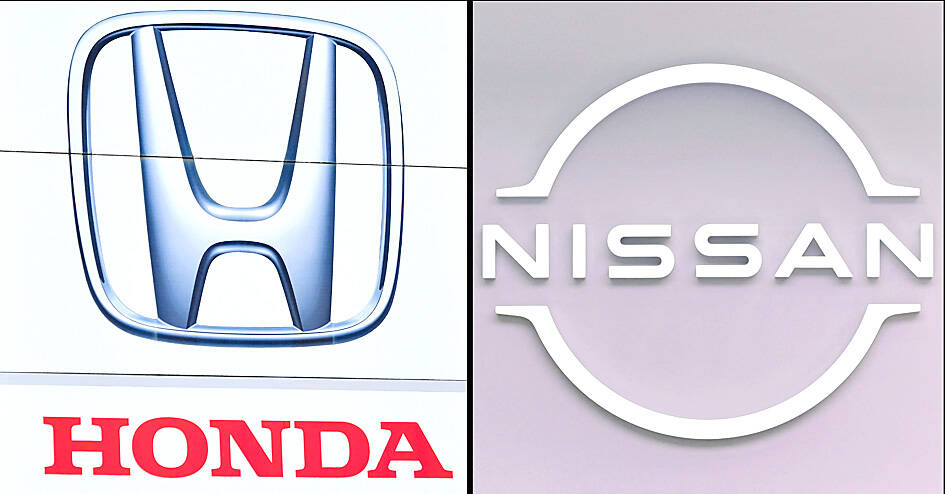Japanese automakers Honda Motor Co, Nissan Motor Corp and Mitsubishi Motors Corp yesterday said that they are dropping their talks for a business integration.
The automakers agreed to end their deal regarding the consideration of the structure for a collaboration, they said in a joint statement.
Honda and Nissan in December last year announced that they were going to hold talks to set up a joint holding company.

Photo: AFP
Mitsubishi had said it was considering joining the group.
From the start, the effort had analysts puzzled as to the advantages to any of the companies, as their model lineups and strengths overlap in an industry shaken by the arrival of newcomers such as Tesla Inc and BYD Co (比亞迪), as well as the move to electrification.
Honda and Nissan initially said that they were trying to finalize an agreement by June and set up the holding company by August.
The three automakers would continue to work together on electric vehicles and smart cars, such as autonomous driving, the statement said.
In the past few weeks, Japanese media had reported about the talks breaking down, citing unidentified sources.
Some said that Nissan balked at becoming a minor player in the partnership with Honda.
Honda is in far better financial shape and was to take the lead in the joint executive team.
The company yesterday reported a 7 percent decline in profit for the nine months that ended in December last year, as its motorcycles business was strong, but its auto sales suffered in China and Japan, while demand stayed solid in the US.
Honda’s April-to-December profit totaled ¥805 billion (US$5 billion), down from ¥869.6 billion in the same period in 2023.
Nine-month sales gained nearly 9 percent to ¥16.3 trillion.
Meanwhile, Nissan yesterday said it expected an annual net loss of ¥80 billion for the fiscal year ending March 31 owing to slumping sales.
The company also lowered its annual operating income outlook to ¥120 billion from ¥150 billion, which was already a major downgrade from its starting guidance of ¥500 billion.
Additional reporting by Bloomberg

Three experts in the high technology industry have said that US President Donald Trump’s pledge to impose higher tariffs on Taiwanese semiconductors is part of an effort to force Taiwan Semiconductor Manufacturing Co (TSMC, 台積電) to the negotiating table. In a speech to Republicans on Jan. 27, Trump said he intends to impose tariffs on Taiwan to bring chip production to the US. “The incentive is going to be they’re not going to want to pay a 25, 50 or even a 100 percent tax,” he said. Darson Chiu (邱達生), an economics professor at Taichung-based Tunghai University and director-general of

‘LEGACY CHIPS’: Chinese companies have dramatically increased mature chip production capacity, but the West’s drive for secure supply chains offers a lifeline for Taiwan When Powerchip Technology Corp (力晶科技) entered a deal with the eastern Chinese city of Hefei in 2015 to set up a new chip foundry, it hoped the move would help provide better access to the promising Chinese market. However, nine years later, that Chinese foundry, Nexchip Semiconductor Corp (合晶集成), has become one of its biggest rivals in the legacy chip space, leveraging steep discounts after Beijing’s localization call forced Powerchip to give up the once-lucrative business making integrated circuits for Chinese flat panels. Nexchip is among Chinese foundries quickly winning market share in the crucial US$56.3 billion industry of so-called legacy

Taiwan Semiconductor Manufacturing Co (TSMC, 台積電) yesterday held its first board of directors meeting in the US, at which it did not unveil any new US investments despite mounting tariff threats from US President Donald Trump. Trump has threatened to impose 100 percent tariffs on Taiwan-made chips, prompting market speculation that TSMC might consider boosting its chip capacity in the US or ramping up production of advanced chips such as those using a 2-nanometer technology process at its Arizona fabs ahead of schedule. Speculation also swirled that the chipmaker might consider building its own advanced packaging capacity in the US as part

A move by US President Donald Trump to slap a 25 percent tariff on all steel imports is expected to place Taiwan-made steel, which already has a 25 percent tariff, on an equal footing, the Taiwan Steel & Iron Industries Association said yesterday. Speaking with CNA, association chairman Hwang Chien-chih (黃建智) said such an equal footing is expected to boost Taiwan’s competitive edge against other countries in the US market, describing the tariffs as "positive" for Taiwanese steel exporters. On Monday, Trump signed two executive orders imposing the new metal tariffs on imported steel and aluminum with no exceptions and exemptions, effective